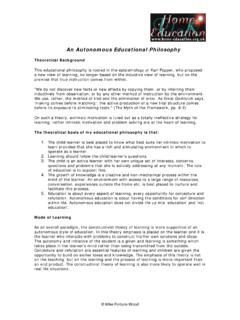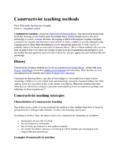Transcription of Planning Effective Educational Programs for Adult Learners
1 World Journal of Education Vol. 7, No. 3; 2017 Published by Sciedu Press 79 ISSN 1925-0746 E-ISSN 1925-0754 Planning Effective Educational Programs for Adult Learners Hong Shi1,* 1 China University of Petroleum-Beijing, Changping District, Beijing 102299, China *Correspondence: China University of Petroleum-Beijing, Changping District, Beijing 102299, China. E-mail: Received: March 2, 2017 Accepted: May 17, 2017 Online Published: June 14, 2017 URL: Abstract Educational program Planning is a complex ongoing process and planners should reflect on and consider for all of the involved factors, context, and people.
2 The purpose of this study is to analyze how to plan Effective Educational Programs for Adult Learners . Adult education is a developmental process and interacts with broad social events. Adult educators should be encouraged to look at events occurring in a larger context for program development. Program planners should consider Adult Learners needs and interests to ensure program development and pedagogical approaches incorporate students needs, expectations and experience into Educational program. Keywords: Educational program; Adult learner; program Planning ; social context This work was supported by the China University of Petroleum-Beijing [grant numbers 2462017 YJRC005]. 1. Introduction Educational program Planning involves a series of decision making which can take place among different organizations, people, and activities (Caffarella, 1994).
3 Adult Learners have characteristics which are different from young Learners including social roles of Adult Learners as parents and employees, obligations to work, family, and communities, abundant experience brought into classroom, and purposes of returning to university such as improving their working skills, developing their careers, and making a better life. According to Knowles (1990), adults are autonomous , self-directed, goal-oriented, and practical, and have accumulated work and life experience, family responsibilities and previous education. Besides, Adult Learners have barriers against participating Educational Programs such as limited time, transportation, motivation, interest, money, and confidence. Based on these characteristics of Adult Learners , educators should design curriculum and adopt instruction methods to meet the needs of adults and to ensure the continual process of learning for adults throughout their life.
4 Unlike more traditional kinds of education, adults and continuing education should respond flexibly to the needs and interests of potential Adult Learners (Long, 1983). 2. Planning Educational Program Rothwell and Cookson (1997) proposed a comprehensive Lifelong Education Program Planning (LEPP) model. In the model they identified four quadrants in program Planning : exercising professional responsibility, engaging relevant contexts, designing the program, and managing administrative aspects ( ). According to Rothwell and Cookson (1997), exercising professional responsibility involves clearly making working philosophy , responsibility and role of educators. In other words, program planners should have their own values, ensure that program Planning continually meets the needs of Learners and develop training based on a moral framework (Kilgore, 2003).
5 According to Kilgore (2003), program planners should pay attention to every step of Planning process and consider for all of the people involved in an Educational program. For example, they should reflect on their values and beliefs about education, and consider perspectives of all stakeholders involved in the program Planning , developing needs of Adult Learners and teachers professional development to ensure continually meet the needs of life learning of adults (Kilgore, 2003). Schroeder (1980) proposes the importance of the linkage between Educational Programs and the broader society. Schroeder believes that Adult and continuing education is a developmental process and the social change dimension World Journal of Education Vol.
6 7, No. 3; 2017 Published by Sciedu Press 80 ISSN 1925-0746 E-ISSN 1925-0754 of program development is important. Adult educators should be encouraged to look at events occurring in the larger society for program development ideas (Long, 1983). According to Long (1983), Adult and continuing education interacts with broader social events including economic, political, and technological changes, and consequently program activity should be informed by an awareness of the implications of such events. Rothwell and Cookson (1997) propose that Educational program Planning requires assessing external and internal situations, learning needs and stakeholders interests, and considering Adult Learners characteristics (Rothwell and Cookson, 1997).
7 According to Rothwell and Cookson (1997), social and economic conditions, labor market, legal and technological factors should also be considered in the program Planning since these factors affect needs and interests of adults and cause the needs of adults change continually. To be specific, the factors include the required skills and qualities for adults in the workforce, available resources and technological innovations for adults education and Educational program, mission and goals of related organization or university, and related laws and government regulations to Educational Programs (Kilgore, 2003), and different organizations or universities and local government have different services to these adults based on their interests and ability, thus, all these factors should be considered in Adult Educational program Planning (Mills, Cervero, Langone, & Wilson, 1995).
8 3. Understanding of Adult Learners Planning Effective Programs and services and helping Adult Learners succeed require a clear understanding of Adult Learners needs and expectations and how adults learn. Andragogy, a theory of Adult learning, makes assumptions about Adult Learners and the design of Adult learning (Knowles, et al., 2005). The Council for Adult and Experiential Learning (CAEL) links learning and work and aims to help every college and university become an Adult Learning Focused Institution (ALFI) one that offers specialized services to make it easier for adults to get the education and training they need and meet the unique needs of Adult students. It emphasizes the importance of understanding the characteristics of the Adult learner because of their non-traditional characteristics create needs and priorities which should be paid special attention when Planning Educational Programs .
9 Therefore, to ensure Adult Learners success and keep them enrolled, an Educational program should be provided to meet their needs and expectations. Kilgore (2003) lists some Adult Learners needs and learning characteristics which are unique to Adult Learners as well as significant to program Planning . These characteristics include various roles of Adult Learners except for being students, obligations to work, family and the community except for course work, abundant experience brought into classroom, and the purpose of returning to the university is to learn and apply practical skills, develop their careers, and make a better life (Graham & Donaldson, 1999). Adults are autonomous and self-directed (Knowles, 1990). Self-directedness requires Adult Learners to take responsibility to adopt their own learning strategies and assessment methods (Merriam & Caffarella, 1991).
10 Self-directed learning is a process in which individuals take initiative, with or without the help of others, to diagnose their learning needs, formulate learning goals, identify resources for learning, select and implement learning strategies, and evaluate learning outcomes (Knowles, 1975, p. 18). Thus, related instruction should help to increase Adult Learners self-regulation, motivation, and confidence. Self-directed Learners can achieve their goals by making continuous adjustments through interactions with their teachers and peers. Educational Programs should help to increase interactions between teachers and Learners and to ensure that Adult Learners get involved in their own learning process. Self-directedness involves motivation, strategies, self-awareness of performance, and sensitivity to environmental and social settings (Zimmerman & Risemberg, 1997).



















